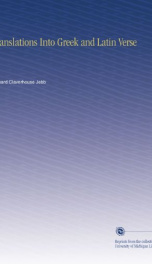bentley

Purchase of this book includes free trial access to www.million-books.com where you can read more than a million books for free. This is an OCR edition with typos. Excerpt from book: CHAPTER IV. THE CONTROVERSY ON THE LETTERS OF PHALAEIS. William Wotton's Reflections on Ancient and Modern Learning (1694) give the best view of a discussion which greatly exercised the wits of the day. " Soon after the Restauration of King Charles II.," says Wotton, " upon the institution of the Royal Society, the comparative excellency of the Old and New Philosophy was eagerly debated in England. But the disputes then managed between Stubbe and Glanvile were rather particular, relating to the Royal Society, than general, relating to knowledge in its utmost extent. In France this controversy has been taken up more at large. The French were not content to argue the point in Philosophy and Mathematicks, but even in Poetry and Oratory too; where the Ancients had the general opinion of the learned on their side. Monsieur de Fontenelle, the celebrated author of a Book concerning the Plurality of Worlds, began the dispute about six years ago [1688], in a little Discourse annexed to the Pastorals." Perrault, going further still than Fontenelle, " in oratory sets the Bishop of Meaux [Bossnet] against Pericles (or rather Thucydides),the Bishop of Nismes [Flechier] against Isocrates, F. Bourdaloue against Lysias, Monsieur Voiture against Pliny, and Monsieur Balzac against Cicero. InPoetry likewise he sets Monsieur Boileau against Horace, Monsieur Corneille and Monsieur Moliere against the Ancient Dramatic Poets." Sir William Temple, in his ''Essay on Ancient and Modern Learning"published in 1692, and dedicated to his own University, Almce Matri Cantabrigiensiwas not less uncompromising in the opposite direction. His general view is that the Ancients surpassed the Moderns, not merely in art and literature, but also in every branch of science, though the records of their scienc...
Info about the book
Author:
Series:
Unknown
ASIN:
B005HIZ7JO
Rating:
4/5 (1)Your rating:
0/5
Languge:
English
Users who have this book
Users who want this book
What readers are saying
What do you think? Write your own comment on this book!
write a commentif you like bentley try:
Other books by this author
Do you want to exchange books? It’s EASY!
Get registered and find other users who want to give their favourite books to good hands!



